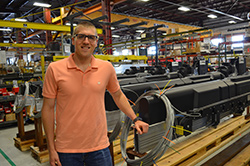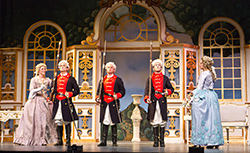News & Notices
Member Spotlight: Ryan Cole

Ryan Cole
Ryan Cole, Project Manager for JR Clancy, Inc., Technical Director, recent graduate of Florida State University with MFA in Technical Production.
USITT: Describe your first experience of theatre.
Ryan: I first took a Tech Drama class in the fall of my sophomore year at Brooke Point High School to fill my elective credit towards graduation. While in the class we had an opportunity to earn some extra credit if we volunteered to be on running crew for the production that semester, so I chose to sign up. We did Arthur Miller’s Playing for Time and I really enjoyed the experience and the people I got to work with on the production. In the classroom, I also enjoyed the fact that I was allowed to use power tools to build the scenery.
Tell us a little about your background -- where did you grow up?
I grew up in Stafford, VA. I have two brothers (one is my fraternal twin). My twin brother just finished his service in the US Army and my little brother is currently in grad school at East Carolina University. I actually wanted to be a veterinarian for most of my childhood until my first dog died and I came to the realization that I would have to be the one to do that to animals at the end of their lives. I couldn’t bear that thought, so I dropped the idea and began exploring other options.
What drew you to technical theatre?
Technical theatre was not my first interest in life, but was really a gift of circumstances. I took that tech drama class to fill the elective credit and because I had not made the school soccer team that last spring and did not want to participate in the conditioning that fall. Once I took the class, so many things pulled me into the world of technical theatre. I loved being able to use power tools at school and get my hands dirty. It really became my favorite class of the day. I also enjoyed the stories that theatre can tell. I always had a strong interest in the events of World War II, specifically the Holocaust, so when I learned we were doing Playing for Time I got even more excited that I was going to be part of that storytelling experience.
 In the end, I think the biggest thing that drew me in was my teacher, Lisa Cover-Tucci. Lisa allowed me to explore all facets of theatrical production over the next three years of my high school career. I was an actor, scenic designer, assistant director, technical director, light board operator, running crew, etc., all because she wanted me to learn as much as possible. Without her influence and guidance I would not have ever gotten into this field. To this day, there aren’t many professional decisions I make in life without talking to her about it at some point.
In the end, I think the biggest thing that drew me in was my teacher, Lisa Cover-Tucci. Lisa allowed me to explore all facets of theatrical production over the next three years of my high school career. I was an actor, scenic designer, assistant director, technical director, light board operator, running crew, etc., all because she wanted me to learn as much as possible. Without her influence and guidance I would not have ever gotten into this field. To this day, there aren’t many professional decisions I make in life without talking to her about it at some point.
What led you to pursue Scenic Construction in college?
Scenic construction wasn’t actually my first interest when I joined the theatre program at East Carolina University. I came in believing that I either wanted to do scenic design because of the opportunity Lisa Cover-Tucci had given me during my senior year of high school to do the design for our production of Neil Simon’s Rumors, or to be a stage manager. That first fall of undergrad I took Reid Parker’s Technical Theatre I class and was assigned to be on running crew for our production of Of Thee I Sing, so I could observe the stage managers running that show. One of the ASM’s for the show was a student named Ted Griffith who was filling his production requirement for the Stage Management class. Through multiple conversations and experiences on that show, Ted convinced me I should switch to Scenic Construction that spring and to come work in the shop. I took him up on that offer and did not leave the shop after that. Reid Parker was and still is the Technical Director at East Carolina University and is one of the most influential people in my life and professional career. Like Lisa, Reid gave me as many opportunities as I wanted while working in the shop to learn and grow as a student, artist, and professional. Even though my degree said Scenic Construction, the education he was giving me truly set the foundation for a path to Technical Direction.
How did you decide to go to grad school?
I knew that I wanted to go to grad school during my senior year of undergrad, as Reid explained to me the importance of a graduate degree for technical directors. However, he did tell me that I should go work for at least a year to learn about the theatre industry from a professional perspective. I listened and went to work as the Scenic Construction Intern at CENTERSTAGE Theatre in Baltimore, MD, under the leadership of Tom Rupp. I learned an incredible amount while working at CENTERSTAGE but found myself observing the aches and pains of the other carpenters working in the shop and knowing that they were only ten years my senior. I did not want to be hurting in that way at that age, so I knew I needed to get to grad school and become a technical director. I had gone to visit Florida State University that previous summer to interview with Robert Coleman for a position in his program. He offered me a spot, so I applied that fall and was enrolled to begin in the fall of 2013.
How did you get involved in USITT?
I went to my first USITT Conference in the spring of 2014 in Fort Worth, TX, while a student at FSU. Prior to grad school I had only attended SETC because it was convenient to ECU and was great for finding summer work, but I had always wanted to attend USITT to explore the seminars and Stage Expo.
How did you get a job with JR Clancy?
It all began as I was online checking out the different seminars being offered for USITT 2014 in Fort Worth to see what I wanted to attend. I stumbled across Stage Rigging 101 led by Bridget Cox and Patrick Finn. I knew I had a decent understanding of rigging from my experiences thus far, but wanted to read the description to see what was considered Rigging 101 for this Conference. For some reason, I also explored the bios for Bridget and Patrick, and discovered that Bridget was the Director of Project Management at JR Clancy and had attended East Carolina University like me. I could not pass up the opportunity to connect to a fellow Pirate and person of leadership with the industry’s leading theatrical rigging manufacturer, so I emailed her and asked if she would be willing to meet with me at the Conference. I attended their session and met with her afterwards to say hello and ask if they had ever done a year-long internship in Project Management at JR Clancy. One of the opportunities that FSU offers for the third year of our graduate studies is to perform an internship in our field of study, and I thought that an internship with JR Clancy would be an excellent opportunity for this. She, fortunately, loved the idea and pitched it to the President, Mike Murphy, at the Conference. Over the next year and a half, Bridget and I stayed in communication and worked to develop this internship. I came to Syracuse, NY, in August of 2015 with my fiancé, Jennifer Lemcke, to perform the internship without the promise of a job offer at the end of the internship. Fortunately, fortune worked in my favor and as a result of my hard work and an increase in projects awarded to JR Clancy, I was offered a position as a Project Manager at JR Clancy. I went down to Tallahassee at the end of April 2016 to graduate with my MFA and began working as a full-time project manager on May 1st of this year.
Name three future goals?
Move into a Leadership position at JR Clancy. Help develop/invent a new technology in the rigging industry. And influence the lives and education of rising students in our industry the way people like Lisa Cover-Tucci, Reid Parker, Robert Coleman, and so many others did for me.
What would you tell a high school student interested in a technical theatre career?
Explore everything about the theatre industry including things outside of technical theatre. This is an industry of incredibly smart, artistic, creative, and generous people. Keep your mind open for new opportunities. I didn’t know Project Management was a career to pursue until Jim Lile, an FSU professor, told me about it when I was discussing my goals for the future.
What is the most important thing to know about rigging?
As my father always taught me, “If you aren’t going to do it right, then don’t do it at all.” Safety is SO important in our industry. I love programs like TIM® (Train. Inspect. Maintain) at JR Clancy that promote safety in our field. Your safety is ALWAYS more important than any production or performance.
Suggest a USITT Member for the Spotlight!
If you know of USITT members whose work should be in the Spotlight, please feel free to suggest them. Contact Lynne Dundas at lynne@usitt.org.

